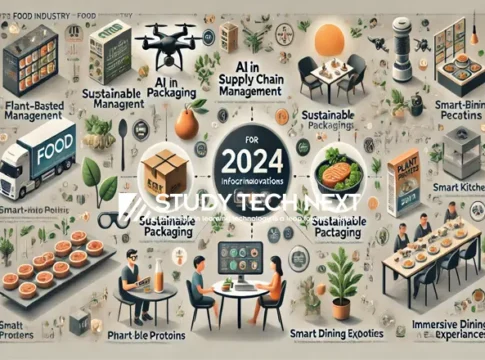The latest innovations in the food industry are making strides toward sustainability, personalization, and advanced technology. Here are some exciting trends shaping the sector in 2024:
Food Safety Enhancements: Innovations like Chemometric Brain are tackling the challenge of food fraud by analyzing products through packaging, ensuring accurate ingredient levels and quality control. Additionally, start-ups like Sensip-dx are streamlining food safety checks with rapid bacterial detection, improving the speed and efficiency of quality assessments in food production.
Sustainability Focus: Sustainable practices are gaining momentum, with a significant push towards upcycling and reducing food waste. Companies are transforming by-products into edible goods, aligning with the circular economy model. Additionally, there’s a growing emphasis on locally sourced and seasonal produce, reducing environmental impacts from long supply chains.
Smart Kitchen Technology: The integration of smart devices is revolutionizing the home kitchen. From AI-powered ovens to robotic chefs like Moley Robotics’ Chef Moto, kitchens are becoming more efficient and tailored to individual needs. This shift includes connected appliances that offer remote control and personalized recipe recommendations, blending convenience with advanced tech.
Personalized Nutrition: Advances in data analysis and AI are leading to personalized nutrition solutions. Tools are being developed to analyze individual genetics and gut microbiomes, helping tailor diets to specific health needs. This trend is extending to wearable devices that provide real-time feedback on food choices, emphasizing health and wellness.
Plant-Based Innovations: The rise of plant-based foods continues to dominate, with new alternatives closely mimicking traditional meat in taste and texture. Companies are also focusing on gut health by fermenting vegetables and grains to create nutrient-rich ingredients that cater to health-conscious consumers.
Food Automation and Robotics: Automation is playing a pivotal role in food processing and packaging. From robotic arms handling delicate packaging to AI systems ensuring consistent product quality, technology is making production faster and more accurate. This trend supports the goals of reducing waste and maintaining high standards.
Alternative Proteins and Fermentation: As consumers seek sustainable and ethical food options, innovations in alternative proteins are gaining traction. Companies are developing lab-grown meats, algae-based proteins, and fermented products that offer the same nutritional benefits as traditional animal proteins. Techniques like precision fermentation are enabling the production of plant-based dairy that mimics the taste and texture of animal-derived products, making plant-based options more appealing to a broader audience
AI-Powered Supply Chain Management: Artificial intelligence is revolutionizing food logistics by optimizing the supply chain from farm to table. AI-driven platforms are enhancing inventory management, predicting demand, and streamlining the transport of fresh produce. These innovations are not only cutting costs but also minimizing food waste by improving the efficiency of storage and delivery processes
Enhanced Food Traceability: With growing concerns over food safety and transparency, the industry is adopting advanced blockchain and IoT technologies to track food products throughout the supply chain. These tools provide consumers with detailed information about the origin, handling, and safety of food items. This transparency is building trust and empowering consumers to make informed choices about their food
Precision Agriculture and Smart Farming: Innovations in smart farming are playing a crucial role in the food industry’s future. Drones, satellite imagery, and machine learning are being used to monitor crop health, optimize irrigation, and detect diseases early. These technologies are making farming more efficient and sustainable, leading to better yields and a reduced environmental footprint
Food Packaging Innovations: Eco-friendly packaging is a priority, with companies experimenting with biodegradable and edible packaging to reduce waste. Innovations include using natural fibers, algae-based films, and reusable containers. These efforts aim to address the growing concerns over plastic waste while providing sustainable solutions for food storage and distribution
Multi-Sensory Dining Experiences: The concept of multi-sensory dining is pushing the boundaries of traditional food experiences. Restaurants are using AR/VR technology to create immersive dining environments, enhancing the flavors and presentation of dishes. This trend is all about combining food with entertainment, making dining a more interactive and engaging experience
Digital and Automated Food Retail: The retail sector is witnessing a transformation with the rise of automated grocery stores and drone deliveries. Automated systems are simplifying shopping by providing cashier-less experiences, while drones are enabling quick delivery of groceries from local stores. This not only enhances convenience but also promotes sustainable, hyper-local food distribution
Focus on Gut Health and Functional Foods: The importance of gut health is reshaping the food landscape. Companies are launching functional foods with prebiotics, probiotics, and fermented ingredients to support digestive health. This trend is driving the development of drinks, snacks, and supplements designed to boost the immune system and improve overall well-being.
These developments reflect a comprehensive shift in the food industry, where technology, sustainability, and consumer health are becoming the focal points. As innovation continues to accelerate, the food sector is poised to become more efficient, ethical, and health-conscious.

